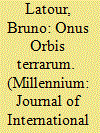|
|
|
Sort Order |
|
|
|
Items / Page
|
|
|
|
|
|
|
| Srl | Item |
| 1 |
ID:
145975


|
|
|
|
|
| Summary/Abstract |
Starting with an insight from Peter Sloterdijk about the enduring notion of Empire in the European idea of sovereignty, this article explores a problem common to the discipline of International Relations, and more generally, geopolitics as well as social theory: the very origin of the notion of an entity endowed with some sort of autonomy over a territory. It is argued that the notion of a bounded entity triggers many artifacts that explains, in part, the failure and denial of world politics, especially over the question of climate change.
|
|
|
|
|
|
|
|
|
|
|
|
|
|
|
|
| 2 |
ID:
142499


|
|
|
|
|
| Summary/Abstract |
This article explores maritime protection zones (MPZ), which are being created in the territorial waters of a number of European states. Through the work of Gaston Bachelard and Peter Sloterdijk, the article analyses maritime zonation as a paradigmatic global security mechanism. It examines how maritime spatial planning seeks to reconfigure sea-space into multi-dimensional spheres of predictability and rationality. These processes, it proposes, seek to routinize the use of sea-space and reconcile tensions between the governance of land and sea, and between fixed infrastructure and mobile capital flows. The political and economic redistribution at stake in the construction of a global network of vast maritime zones, which act as hubs of wealth creation and environmental management, creates further tensions where commercial and military security imaginaries meet local and ecological interests. The article traces the ontology of multi-dimensional zonation and concludes that space which emerges from a pluralist and less anthropocentric understanding of the maritime would provide more effective security.
|
|
|
|
|
|
|
|
|
|
|
|
|
|
|
|
| 3 |
ID:
117438


|
|
|
|
|
| Publication |
2012.
|
| Summary/Abstract |
It is almost a truism to say that people increasingly dwell in a transnational context, that is, in-between societal systems and together with multiple nationalities. Increasingly, people are living in a different nation in which they were born. The nation-states people dwell in cannot be equated with territorial container-boxes anymore, if this ever could. The uniform and straight lines in the sand, that borders once were thought to be, are now better understood as a complex choreography of border lines in multiplied lived spaces. This article zooms in on a specific kind of dwelling with multiple borders. It tries to get a conceptual hold of contemporary dwelling places of short-distance migrants across a EU inner border, in this case the Dutch-German border. In recent years, much facilitated by EU cross-border cohesion policies, a substantial number of Dutch people have bought or built a house just across the border in Germany. This has created an interesting new phenomenon of cross-border dwelling, in which the new location of the house is just across the border and the living largely still goes on in the country of origin. This living in two nations at the same time at such a short distance is what we wish to understand better conceptually in this article. We argue that two fundamentally opposed philosophical dwelling conceptualisations could be distinguished. On the one hand one could distinguish a philosophical view in which dwelling is a form of a Heideggerian nest, where people open a space of being, an intimate and secure bordered place, sheltering themselves for the outside world. On the other hand then, a philosophical view could be distinguished in which dwelling is driven by a Deleuzian need to free oneself from a binding b/order of home, through a constant be-coming and estrangement, hence by constantly othering oneself. We argue that in order to understand the borderscape dwellings of Dutch migrants in German borderlands, there is a need to relate these two ends of the dwelling continuum. The argument that we bring forward is that a borderline necessarily moves between total (self-)imprisonment and total escapist openness, making borders in an ontological sense intrinsicially and unavoidably always a shifting line in the sand. In our view, Peter Sloterdijk's imaginative Sphären (Spheres) trilogy could help as a conceptual stimulus to create that much needed bridge between the bordering efforts of nesting and the debordering desire to escape from it. Using Sloterdijk's spherical concepts, the dwelling can be seen as a place which is constantly changing from a secure bubble-like place into a multidimensional foam-like place and back again. With this spherical understanding of the house we argue that this conceptual 'spheric' stimulus could help to rethink the complex and ambivalent character of cross-border dwelling places in an increasingly transnational world.
|
|
|
|
|
|
|
|
|
|
|
|
|
|
|
|
|
|
|
|
|